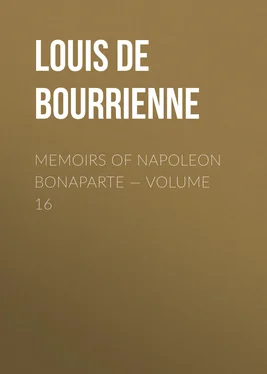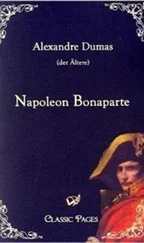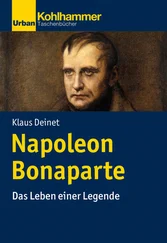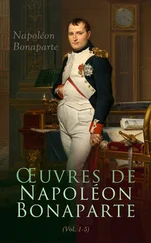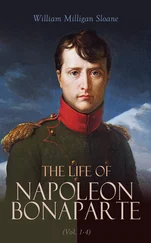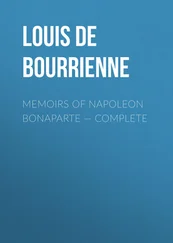Louis Bourrienne - Memoirs of Napoleon Bonaparte — Volume 16
Здесь есть возможность читать онлайн «Louis Bourrienne - Memoirs of Napoleon Bonaparte — Volume 16» — ознакомительный отрывок электронной книги совершенно бесплатно, а после прочтения отрывка купить полную версию. В некоторых случаях можно слушать аудио, скачать через торрент в формате fb2 и присутствует краткое содержание. Жанр: Биографии и Мемуары, История, foreign_edu, foreign_antique, foreign_prose, на английском языке. Описание произведения, (предисловие) а так же отзывы посетителей доступны на портале библиотеки ЛибКат.
- Название:Memoirs of Napoleon Bonaparte — Volume 16
- Автор:
- Жанр:
- Год:неизвестен
- ISBN:нет данных
- Рейтинг книги:3 / 5. Голосов: 1
-
Избранное:Добавить в избранное
- Отзывы:
-
Ваша оценка:
- 60
- 1
- 2
- 3
- 4
- 5
Memoirs of Napoleon Bonaparte — Volume 16: краткое содержание, описание и аннотация
Предлагаем к чтению аннотацию, описание, краткое содержание или предисловие (зависит от того, что написал сам автор книги «Memoirs of Napoleon Bonaparte — Volume 16»). Если вы не нашли необходимую информацию о книге — напишите в комментариях, мы постараемся отыскать её.
Memoirs of Napoleon Bonaparte — Volume 16 — читать онлайн ознакомительный отрывок
Ниже представлен текст книги, разбитый по страницам. Система сохранения места последней прочитанной страницы, позволяет с удобством читать онлайн бесплатно книгу «Memoirs of Napoleon Bonaparte — Volume 16», без необходимости каждый раз заново искать на чём Вы остановились. Поставьте закладку, и сможете в любой момент перейти на страницу, на которой закончили чтение.
Интервал:
Закладка:
One day at dinner Napoleon, casting his eye on one of the dishes of his own campaign-service, on which the-arms of the King had been engraved, "How they have spoiled that!" he exclaimed; and he could not refrain from observing that the King was in great haste to take possession of the Imperial plate, which certainly did not belong to him. Amongst the baggage was also a cabinet in which were a number of medallions, given him by the Pope and other potentates, some letters of Louis XVIII. which he had left behind him on his writing-table in the suddenness of his flight from the Tuileries on the 20th of March, and a number of other letters found in the portfolio of Dia Blacas intended to calumniate Napoleon.
The Emperor never dressed until about four o'clock he then walked in the garden, which was particularly agreeable to him on account of its solitude—the English soldiers having been removed at Mr. Balcombe's request. A little arbour was covered with canvas; and a chair and table placed in it, and here Napoleon dictated a great part of his Memoirs. In the evening, when he did not go out, he generally contrived to prolong the conversation till eleven or twelve o'clock.
Thus time passed with little variety or interruption. The weather in the winter became delightful. One day, his usual task being done; Napoleon strolled out towards the town, until he came within sight of the road and shipping. On his return he met Mrs. Balcombe and a Mrs. Stuart, who was on her way back from Bombay to England. The Emperor conversed with her on the manners and customs of India, and on the inconveniences of a long voyage at sea, particularly to ladies. He alluded to Scotland, Mrs. Stuart's native country, expatiated on the genius of Ossian, and congratulated his fair interlocutor on the preservation of her clear northern complexion. While the parties were thus engaged some heavily burdened slaves passed near to them. Mrs. Balcombe motioned them to make a detour; but Napoleon interposed, exclaiming, "Respect the burden, madam!" As he said this the Scotch lady, who had been very eagerly scanning the features of Napoleon, whispered to her friend, "Heavens! what a character, and what an expression of countenance! How different to the idea I had formed of him!"
Napoleon shortly after repeated the same walk, and went into the house of Major Hudson. This visit occasioned considerable alarm to the constituted authorities.
The Governor gave a ball, to which the French were invited; and Las Cases about the same time rode over to Longwood to see what advance had been made in the preparations for their reception. His report on his return was not very favourable. They had now been six weeks at the Briars, during which Napoleon had been nearly as much confined as if on board the vessel. His health began to be impaired by it. Las Cases gave it as his opinion that the Emperor did not possess that constitution of iron which was usually ascribed to him; and that it was the strength of his mind, not of his body, that carried him through the labours of the field and of the cabinet. In speaking on this subject Napoleon himself observed that. nature had endowed him with two peculiarities: one was the power of sleeping at any hour or in any place; the other, his being incapable of committing any excess either in eating or drinking: "If," said he, "I go the least beyond my mark my stomach instantly revolts." He was subject to nausea from very slight causes, and to colds from any change of air.
The prisoners removed to Longwood on the 10th of December 1815. Napoleon invited Mr. Balcombe to breakfast with him that morning, and conversed with him in a very cheerful manner. About two Admiral Cockburn was announced; he entered with an air of embarrassment. In consequence of the restraints imposed upon him at the Briars, and the manner in which those of his suite residing in the town had been treated, Bonaparte had discontinued receiving the visits of the Admiral; yet on the present occasion he behaved towards him as though nothing had happened. At length they left the Briars and set out for Longwood. Napoleon rode the horse, a small, sprightly, and tolerably handsome animal, which had been brought for him from the Cape. He wore his uniform of the Chasseurs of the Guard, and his graceful manner and handsome countenance were particularly remarked. The Admiral was very attentive to him. At the entrance of Longwood they found a guard under arms who rendered the prescribed honours to their illustrious captive. His horse, unaccustomed to parades, and frightened by the roll of the dram, refused to pass the gate till spurred on by Napoleon, while a significant look passed among the escort. The Admiral took great pains to point out the minutest details at Longwood. He had himself superintended all the arrangements, among which was a bath-room. Bonaparte was satisfied with everything, and the Admiral seemed highly pleased. He had anticipated petulance and disdain, but Napoleon manifested perfect good-humour.
The entrance to the house was through a room which had been just built to answer the double purpose of an ante-chamber and a dining-room. This apartment led to the drawing-room; beyond this was a third room running in a cross direction and very dark. This was intended to be the depository of the Emperor's maps and books, but it was afterwards converted into the dining-room. The Emperor's chamber opened into this apartment on the right hand side, and was divided into two equal parts, forming a cabinet and sleeping-room; a little external gallery served for a bathing-room: Opposite the Emperor's chamber, at the other extremity of the building, were the apartments of Madame Montholon, her husband, and her son, afterward used as the Emperors library. Detached from this part of the house was a little square room on the ground floor, contiguous to the kitchen, which was assigned to Las Cases. The windows and beds had no curtains. The furniture was mean and scanty. Bertrand and his family resided at a distance of two miles, at a place called Rut's Gate. General Gourgaud slept under a tent, as well as Mr. O'Meara, and the officer commanding the guard. The house was surrounded by a garden. In front, and separated by a tolerably deep ravine, was encamped the 53d Regiment, different parties of which were stationed on the neighbouring heights.
The domestic establishment of the Emperor consisted of eleven persons. To the Grand-Marshal was confided the general superintendence; to M. de Montholon the domestic details; Las Cases was to take care of the furniture and property, and General Gourgaud to have the management of the stables. These arrangements, however, produced discontent among Napoleon's attendants. Las Cases admits that they were no longer the members of one family, each using his best efforts to promote the advantage of all. They were far from practising that which necessity dictated. He says also, "The Admiral has more than once, in the midst of our disputes with him, hastily exclaimed that the Emperor was decidedly the most good-natured, just, and reasonable of the whole set."
On his first arrival he went to visit the barracks occupied by some Chinese living on the island, and a place called Longwood Farm. He complained to Las Cases that they had been idle of late; but by degrees their hours and the employment of them became fixed and regular. The Campaign of Italy being now finished, Napoleon corrected it, and dictated on other subjects. This was their morning's work. They dined between eight and nine, Madame Montholon being seated on Napoleon's right; Las Cases on his left, and Gourgaud, Montholon, and Las Cases' son sitting opposite. The smell of the paint not being yet gone off, they remained not more than ten minutes at table, and the dessert was prepared in the adjoining apartment, where coffee was served up and conversation commenced. Scenes were read from Moliere, Racine, and Voltaire; and regret was always expressed at their not having a copy of Corneille. They then played at 'reversis', which had been Bonaparte's favourite game in his youth. The recollection was agreeable to him, and he thought he could amuse himself at it for any length of time, but was soon undeceived. His aim was always to make the 'reversis', that is, to win every trick. Character is displayed in the smallest incidents.
Читать дальшеИнтервал:
Закладка:
Похожие книги на «Memoirs of Napoleon Bonaparte — Volume 16»
Представляем Вашему вниманию похожие книги на «Memoirs of Napoleon Bonaparte — Volume 16» списком для выбора. Мы отобрали схожую по названию и смыслу литературу в надежде предоставить читателям больше вариантов отыскать новые, интересные, ещё непрочитанные произведения.
Обсуждение, отзывы о книге «Memoirs of Napoleon Bonaparte — Volume 16» и просто собственные мнения читателей. Оставьте ваши комментарии, напишите, что Вы думаете о произведении, его смысле или главных героях. Укажите что конкретно понравилось, а что нет, и почему Вы так считаете.
